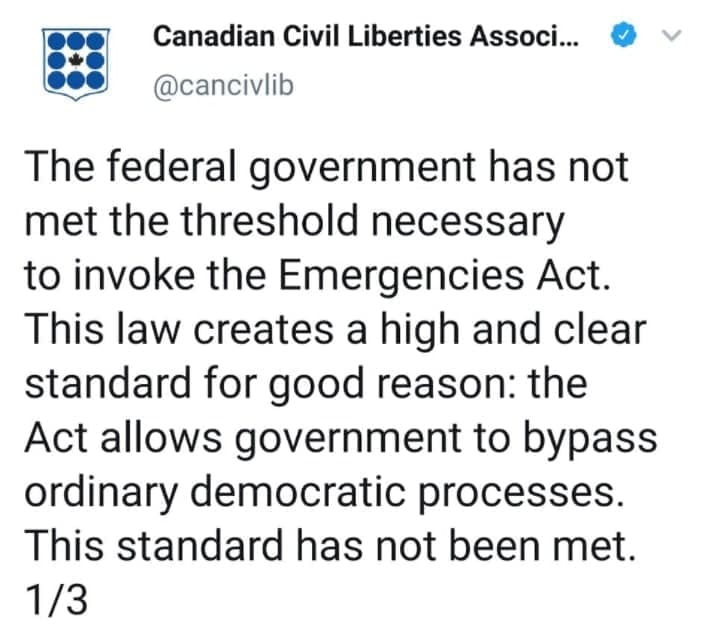RIO DE JANEIRO, BRAZIL – A nebulous wreath of different actions has formed around the Trudeau government’s activation of the never before used emergencies act. Even before Prime Minister Justin Trudeau resorted to his last or penultimate resort, the crowdfunding website GiveSendGo had been hacked over the weekend.
Names and email addresses of thousands of donors were thus publicly accessible. An official of the governing party in the province of Ontario, who had donated $100 to Freedom Convoy, was pressured to resign or give up his job.
In addition, the Canadian state television CBC immediately used the leaked data for research on the donors – all this despite the fact that the data had become public through illegal actions.
Many Canadians are not satisfied with being implicitly treated like terrorists by their government and wonder where the decisive actions of the Trudeau government were when the BLM and Antifa protests spilled over into Canada in the summer of 2020.
(Bloc Québécois Leader Yves-François Blanchet has spoken out against the federal government’s use of the Emergencies Act to respond to protests.)
But yes, Trudeau had once started out as a super-liberal who championed small farmers’ roadblocks in India and believed, “When a government starts canvassing or avoiding other views, it loses its moral authority.” It was a phrase from his predecessor Stephen Harper that Trudeau pompously quoted a decade ago.
Ottawa’s resigned “progressive” police chief – Peter Sloly is African-American – notes in a press release that he has seen his role since the demonstration began as primarily maintaining the safety of the city.

This seems to have succeeded, although Sloly was accused of being too soft on the truckers. The minister in charge of disaster control, Bill Blair, was saddened by the departure. Under the state of emergency now declared, public gatherings can be banned and citizens’ freedom of movement restricted, although Trudeau claims that’s not his goal.
(Yesterday, the Premier of Ontario, Doug Ford blew up Justin Trudeau’s house of cards: “Everybody is done with this. We are done with this!”)
Meanwhile, a simple response to the government’s grab for Canadians’ private bank accounts is forming on Twitter. “Time to withdraw your money,” one user writes succinctly. Others want to withdraw at least some of their funds to send a message.
The political – or rather ideological – orientation of senior executives is addressed: Would you give in to the state’s grip or deny cooperation? A bank that engages in such action no longer seems trustworthy to many.
(Feb. 17 press conference by former law enforcement members and veterans of Freedom Convoy in Ottawa after Justin Trudeau declared a state of emergency.
Beyond these individual opinions, there is the general expectation of a run on bank counters that will come in the coming days.
CANADIAN BANKS OUTAGE MYSTERY
Canada’s big five banks all went offline simultaneously on Wednesday, leaving customers unable to access online banking or make transfers for hours. Some still reported outages Thursday too.
Royal Bank of Canada, Bank of Montreal, Scotiabank, TD Bank Canada and Canadian Imperial Bank of Commerce were all affected – and mysteriously just days after Prime Minister Trudeau used emergency legislation to force all crowdfunding payments to be registered with government regulator FINTRAC.
On Wednesday, Justice Minister David Lametti told CTV News: “If you are a member of a pro-Trump movement who’s donating… you ought to be worried” [about your bank account being frozen].
The relevant authorities have started sharing names of individuals and corporations, as well as their cryptocurrency wallets, with financial institutions to freeze the accounts of some people involved with convoy blockades and protests, federal ministers say.
Deputy Prime Minister Chrystia Freeland told reporters in a press conference on Feb. 17 that information is now being shared by law enforcement with Canada’s financial institutions to cut off funding for the ongoing protests that oppose the federal government’s COVID-19 mandates.
“The names of both individuals and entities, as well as crypto-wallets have been shared by the RCMP with financial institutions, and accounts have been frozen, and more accounts will be frozen. Crowdfunding platforms and payment service providers have started the registration process with FINTRAC,” Freeland said.
Freeland refused to release the specific numbers on how many accounts, either personal or corporate, have been targeted, saying that she doesn’t want to jeopardize the “operational actions [that] are being taken.”
TRUDEAU SCORCHED FOR SWASTIKAS COMMENT TO JEWISH CONSERVATIVES
The Canadian PM has landed himself in hot water with Jewish MPs, after saying that Conservative legislators support “people who wave swastikas.”
“Mr. Speaker, I’ve never seen such shameful and dishonorable remarks coming from this prime minister,” said Conservative MP Dane Lloyd, “There are members of this Conservative caucus who are the descendants of victims of the Holocaust“.
(The Canadian PM has landed himself in hot water with Jewish MPs, after saying that Conservative legislators support “people who wave swastikas.”)
Politicians demanded an apology from Trudeau, who’s been facing a PR nightmare over the ‘Freedom Convoy’ protests – with some MPs calling his policies “divisive.”

